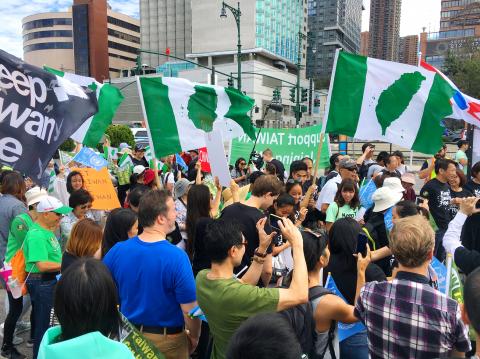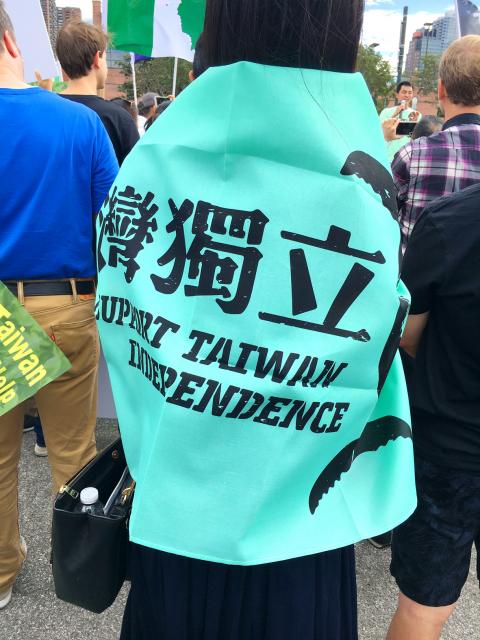As the UN General Assembly convenes in New York, supporters of Taiwan hit the streets of Manhattan Saturday to protest the country’s exclusion from the UN amid China’s ramped-up efforts to shrink Taiwan’s space on the international stage.
The annual march, which began near the People’s Republic of China consulate on 42nd Street, was expected to attract between 300 and 500 people, said Gloria Hu (胡慧中) of Keep Taiwan Free, a grassroots movement that helped organize the event.
It attracted a mix of young and old Taiwanese Americans and Canadians, overseas Taiwanese, supporters of Tibet and others, who walked together to Dag Hammarskjold Plaza, a space fenced in by New York Police Department metal barricades just a few blocks away from the UN building.

Photo courtesy of Chris Fuchs
Also in attendance were New Power Party Legislator Hsu Yung-ming (徐永明), as well as Democratic Progressive Party legislators Lin Ching-yi (林靜儀), Lee Li-feng (李麗芬) and Chen Man-li (陳曼麗).
The march and rally, held annually for more than 20 years, comes as the 73rd regular session of the UN General Assembly kicked off on Sept. 18.
CHINESE OPPOSITION

Photo courtesy of Chris Fuchs
While Taiwan’s government has maintained an approach of not actively seeking UN membership, demonstrators said they were still hopeful that the island nation — one of just a few countries excluded from the UN — would someday get back the seat it lost in 1971, when it was given to China.
“We would like to see a harder push, especially now with this escalating aggression from the Chinese government,” Hu said.
That aggression includes China pressuring international airlines to exclude references on their Web sites to Taiwan as a country, jailing Taiwanese human rights advocate Lee Ming-che (李明哲) and escalating military action around Taiwan.
China has also been poaching allies from Taiwan, bringing the number of countries that have diplomatic relations with Taiwan to just 17.
Beijing has repeatedly opposed Taiwan’s entry into the UN, claiming it as its own and saying Taiwan is not a sovereign state.
Joshua Wang (王中煒), a 30-year-old raised in Taiwan who marched for the first time Saturday, said he came to protest what he called the “Chinese Communist Party’s repression against Taiwan.”
He said China’s demand that foreign airlines eliminate references to Taiwan as a country on their Web sites and in marketing materials was what jolted him into action.
“I had to stand up and do something for my motherland, Taiwan,” Wang said.
This year, Hu said they also organized a series of events for the week leading up to the march.
STAND UP TO CHINA’S BULLYING
One was a joint rally with groups including Tibetans, Southern Mongolians and Uyghurs, who protested against Chinese President Xi Jinping (習近平) last Tuesday outside UN headquarters, according to Hu.
They also launched a bike ad campaign last Monday. Large billboards, five in all, have been towed by bikes in parts of Manhattan to raise awareness about China’s treatment of Taiwan.
“How have five countries been coerced to cut diplomatic ties with Taiwan since 2016?” one of the ads reads. “Find out at taiwanmatters.com. Stand up to China’s bullying across the globe.”
Hu said the bikes had been going out for five hours a day, every day since last Monday, targeting foot and commuter traffic. They’ve made the rounds near Penn Station, the Port Authority Bus Terminal, the UN, in Midtown and the Flatiron District, as well as Washington Square Park, according to Hu.
“I think people are stopping to pay attention,” she said.
The group also brought in two exhibits, including one called “Hospital Without Borders,” which was featured at Washington Square Park, Hu said.
“Hospital Without Borders” appeared in May near the World Health Organization headquarters in Geneva, Switzerland, ahead of the World Health Assembly, in an effort to showcase the value, achievements and contributions of Taiwan’s public healthcare system.
After getting invitations to attend the annual meetings as an observer for eight consecutive years, Taiwan was not invited last year or this May.
“We want people to know all the things Taiwan does, not just the things China does to us,” Hu said, explaining the importance of the educational exhibits.
Despite not making a push for UN membership this year, Taiwan did send cabinet officials to attend a series of events in New York showcasing the nation’s efforts to achieve the UN’s Sustainable Development Goals and lobby for support for Taiwan’s participation in UN events.
For the older hands who showed up to Saturday’s rally, they said they still come out year after year because they believe Taiwan will one day make it back into the UN.
“Everything takes time,” said Doris Liu (張秀美), speaking in a mix of English and Mandarin.
Now in her 70s, Liu has attended the march for a few decades. She said she and her husband, Vincent (劉照男), were gladdened and proud to see so many younger men and women of Taiwanese descent in attendance.
“There is hope,” Liu said.

Even by the standards of Ukraine’s International Legion, which comprises volunteers from over 55 countries, Han has an unusual backstory. Born in Taichung, he grew up in Costa Rica — then one of Taiwan’s diplomatic allies — where a relative worked for the embassy. After attending an American international high school in San Jose, Costa Rica’s capital, Han — who prefers to use only his given name for OPSEC (operations security) reasons — moved to the US in his teens. He attended Penn State University before returning to Taiwan to work in the semiconductor industry in Kaohsiung, where he

On May 2, Chinese Nationalist Party (KMT) Chairman Eric Chu (朱立倫), at a meeting in support of Taipei city councilors at party headquarters, compared President William Lai (賴清德) to Hitler. Chu claimed that unlike any other democracy worldwide in history, no other leader was rooting out opposing parties like Lai and the Democratic Progressive Party (DPP). That his statements are wildly inaccurate was not the point. It was a rallying cry, not a history lesson. This was intentional to provoke the international diplomatic community into a response, which was promptly provided. Both the German and Israeli offices issued statements on Facebook

May 18 to May 24 Pastor Yang Hsu’s (楊煦) congregation was shocked upon seeing the land he chose to build his orphanage. It was surrounded by mountains on three sides, and the only way to access it was to cross a river by foot. The soil was poor due to runoff, and large rocks strewn across the plot prevented much from growing. In addition, there was no running water or electricity. But it was all Yang could afford. He and his Indigenous Atayal wife Lin Feng-ying (林鳳英) had already been caring for 24 orphans in their home, and they were in

Perched on Thailand’s border with Myanmar, Arunothai is a dusty crossroads town, a nowheresville that could be the setting of some Southeast Asian spaghetti Western. Its main street is the final, dead-end section of the two-lane highway from Chiang Mai, Thailand’s second largest city 120kms south, and the heart of the kingdom’s mountainous north. At the town boundary, a Chinese-style arch capped with dragons also bears Thai script declaring fealty to Bangkok’s royal family: “Long live the King!” Further on, Chinese lanterns line the main street, and on the hillsides, courtyard homes sit among warrens of narrow, winding alleyways and